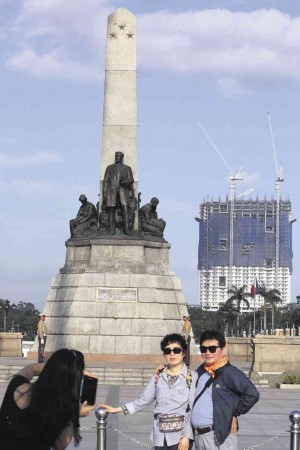Torre builder says halt work order arbitrary

Torre de Manila is impossible to miss in the background as tourists have their picture taken at the Rizal Monument. Niño Jesus Orbeta
MANILA, Philippines—The order from the National Commission on Culture and the Arts (NCCA) to temporarily stop construction of the Torre de Manila condominium is in violation of the antigraft and corrupt practices act because of its “unreasonable, confiscatory and arbitrary” nature.
This was the comment submitted by building developer DMCI Homes, Inc. to the NCCA which is conducting a hearing on whether or not to permanently stop the project which, according to critics, mars the line of sight of the Rizal Park and Monument.
DMCI Homes, through Roel Pacio, its vice president for legal, permits and tax management, said that the NCCA’s cease and desist order (CDO) has caused undue injury to the company which has complied with all the requirements for the building.
“The issuance of the CDO caused undue injury to [DMCI] … [which is] entitled to completion of a lawful project that was issued all necessary permits, licenses, clearances and certifications and City Council resolutions,” the comment which was seen by the Inquirer read.
“With all due respect, such patently wrongful issuance of the CDO is penalized with civil, criminal and administrative sanctions under Section 3(E) of Republic Act No. 3019, otherwise known as the antigraft and corrupt practices act,” it added.
The company also claimed that the issuance of the CDO was unreasonable and confiscatory as it prevented the company from proceeding with the project indefinitely.
“By ordering the cessation of all construction activities in disregard of the government permits, licenses and clearances issued to [DMCI], this honorable commission has unduly curtailed [DMCI’s] right as a citizen, taxpayer and property owner. The CDO amounts to undue taking of private property in the constitutional sense, which entitles [DMCI] to just compensation,” it claimed.
The DMCI also criticized the NCCA for picking on the project despite the proliferation of other high-rise buildings near the Rizal Park and Monument.
It specifically pointed out to two buildings on Kalaw Avenue: Sunview Palace, a 42-story building which DMCI said was just 250 meters away from the Rizal Monument, and Eton Baypark Condominium, a 29-story building 235 meters away from the monument.
In contrast, Torre de Manila is 870 meters away from the monument, it added.
“However, despite the presence of these towering condominiums that are closer to the Rizal Monument, this honorable commission singled out Torre de Manila for the issuance of the CDO,” the comment read.
The company added that because of its distance from the monument, the construction of the condominium does not affect the structural and physical integrity of the monument itself.
The DMCI also argued that the NCCA has no mandate to issue the CDO against it as Torre de Manila sits on private property, and that Rizal Park, which the agency seeks to protect, was not a world heritage site or the work of a national artist.
It also noted that there were procedural lapses in issuing the CDO, which should be issued by the NCCA board of commissioners and not just the NCCA chair.
The NCCA is set to present its arguments in defense of the CDO in a hearing on March 9.
It issued the CDO on Jan. 5 which was served to the DMCI at the Torre de Manila construction site and company office in Makati on Jan. 13. The agency said that the CDO would be implemented indefinitely until it has determined whether or not construction of the condominium “destroys or significantly alters the landscape” of the Rizal Monument.
The NCCA, however, claimed that the DMCI has not abided by the CDO as shown by footage of ongoing construction at the work site.